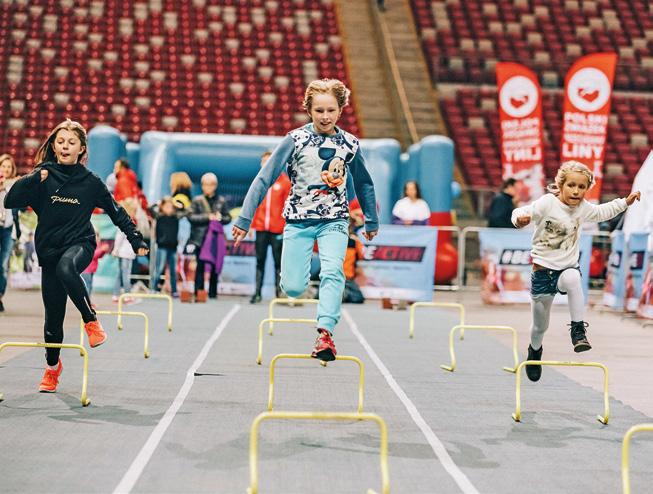
4 minute read
SALTO EECA
PHOTO: KRZYSZTOF KUCZYK
Following the launch of the Erasmus+ Programme in 2014, the SALTO EECA team focussed on improving the quality of educational events organised by the Centre, resulting in new partnerships and long-term projects
Closer to the East
Erasmus+ is the third Community programme aimed at the development of young Europeans, which covers with its scope not only the countries of the European Union, but also its eastern neighbours – Russia and the Eastern Partnership countries: Armenia, Azerbaijan, Belarus, Georgia, Moldova and Ukraine. The main institution supporting the development of international youth activities in the region is the SALTO EECA Centre, i.e. the Eastern Europe and the Caucasus Resource Centre. It is a part of a network of seven SALTO YOUTH centres present in various European Union countries. The common goal of these institutions is, among other things, to improve the quality of youth projects. The centres do not award grants, but carry out intensive information and training activities. Polish SALTO EECA Resource Centre was established in 2003, and from the very beginning it has supported international co-operation with the countries of Eastern Europe and Caucasus within the framework of European Union programmes in the youth field. Since 2017, the Erasmus+ Youth and
European Solidarity Corps information centres have operated in each of the seven neighbouring countries. These are officially designated organisations with many years of experience in youth work at local and international level. Their main aim is to inform about the possibilities offered by European youth programmes and to support the quality of projects implemented in the region.
In the 2014–2020 Erasmus+ framework, the SALTO EECA Resource Centre supported organisations operating in neighbouring countries, co-organising on several occasions the Eastern Partnership Youth Forums (Riga 2015; Warsaw 2017; Vilnius 2019) and the Eastern Partnership Youth Conferences (Bratislava 2016; Vienna 2018). Moreover, the Centre has strengthened contacts, especially with the countries where activity was quite low. For example, in 2018 and 2019, it joined the efforts aimed at the establishment of an international youth section of the soci-economic forums of Northern Caucasus organised in the Russian Federation.
One of the tasks of the SALTO EECA Resource Centre aimed at improving the quality of youth projects in Eastern Partnership countries and Russia is to accredit organisations wishing to participate in volunteer projects within the framework of European Union programmes. In the years 2014–2020, a total of 455 accreditations were granted by the SALTO EECA, of which 388 related to Erasmus+ and 67 to the European Solidarity Corps. Thanks to these documents, the organisations can apply for co-organisation of projects addressed to young people or youth workers.
In the countries of Eastern Europe and Caucasus, from 2014 until the end of the first consolidated Erasmus+ framework, the SALTO EECA Resource Centre organised and carried out 72 training courses for participants in the European Voluntary Service upon their arrival in the host country and 65 training courses on indirect evaluation. These events were attended by about 2,000 people. In addition, 22 events for former volunteers who completed their projects in the Eastern Partnership countries and Russia took place in the countries of the region and were attended by 435 people. The majority of project graduates came from France, Germany, Poland and Italy, and most often they were hosted by Georgian and Ukrainian organisations.
In the first consolidated perspective of the Erasmus+ Programme, the SALTO EECA Resource Centre also focussed on social inclusion. The project started with a study prepared together with several Erasmus+ national agencies and the SALTO-YOUTH Inclusion & Diversity Resource Centre, which analysed the needs of and challenges faced by young people working in the Eastern Partnership and Russia region. The results of the survey significantly influenced the training activities that were included in the SALTO EECA offer. The number of projects addressed to people working with marginalised groups has increased, and the initiatives have become more diverse and targeted the specific needs of particular groups, e.g. young people from rural areas, people with disabilities and socially excluded groups.
In 2020, the largest number of accredited organisations operated in Russia: 77, and in Ukraine and Georgia: 70 each
2014 the SALTO EECA Resource Centre activities focus on the implementation of the Erasmus+ Programme in the Youth sector, including the promotion of its offer and information on how organisations from programme countries and these in Eastern Europe and Caucasus can seek partners
2015 a very important event: Eastern Partnership Youth Forum is organised in Latvian Riga. This is a clear signal from the European Union showing that youth co-operation is a valuable element of policy development
2016 the SALTO EECA team is involved in the development of new youth initiatives: it holds consultations on the principles and structure of the Eastern Partnership Youth Window and supports the establishment of the Polish-Ukrainian Council of Youth Exchange
2017 a network of Erasmus+ Youth Information Centres is established in the Eastern Partnership countries and in Russia
2018 the European Solidarity Corps is launched and the SALTO EECA Resource Centre joins in information activities. It also awards the first European Solidarity Corps
Quality Labels to organisations from the Eastern Partnership region and Russia
2019 the HOP platform is revamped It is a tool developed . by SALTO EECA to support youth organisations in remote learning, and to provide space to collect and share e-learning contents
2020 a time of new challenges and the digitisation of international co-operation. The first virtual Eastern
Partnership Youth Engagement Summit takes place. It proves that even in challenging conditions the international dimension of youth co-operation will thrive










